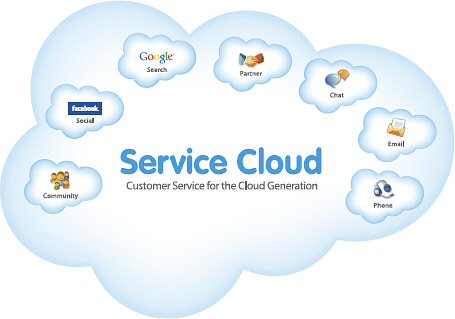Salesforce.com Service Cloud integrates enterprise social media

Cloud computing vendor, Salesforce.com, has extended its service and support product line with Service Cloud, a set of technologies integrating community-generated knowledge with traditional call center data.
With this announcement, Salesforce establishes an important strategic push for the company, which Chairman and CEO, Marc Benioff, called a billion-dollar opportunity. Importantly, Service Cloud also demonstrates that social media can offer measurable ROI in the enterprise, which is a big deal.
Key components include:
- Customer communities for interaction not just posting. Salesforce.com wants to host corporate communities.
- Social networking connections. Salesforce.com said its Service Cloud will connect to Facebook, forums and blogs. The goal: Absorb information into a corporate knowledge base.
- Search ranking. Salesforce.com promises that Service Cloud results will be ranked near the top of Google results.
- Partner information sharing via the cloud.
- Multi-channel–phone, email and chat–support hosted in the cloud.
The most significant innovation is how Service Cloud parses social networking conversations to integrate that dispersed, user-generated data into existing call center knowledge bases and workflows. The other components are infrastructure and glue that enable Salesforce customers to collect, share, and work with community-generated data.
This diagram summarizes the components:

To explain how this works, Salesforce uses the example of a person seeking technical support on a particular issue. He or she posts questions on Facebook and receives replies helping solve the problems. Based on a variety of metrics and analysis, Service Cloud determines which questions and responses represent meaningful issues and accurate answers.
The system then incorporates this knowledge into the standard Salesforce customer service application, where it can be shared with support reps, put on the web, used in self-service customer environments, and so on.
The following screen capture shows how Salesforce tracks these social media "conversations:"
Despite the potential in this system, much depends on the conversation parsing mechanism's ability to separate useful information from noise. In effect, discrete question/answer groups become the "unit of trust" (or confidence) on which the entire system depends. The downstream processing has value only to the degree this basic unit offers high quality and relevant information.
Although knowledge management is an established discipline, parsing raw conversational data into useful information remains a challenge. Therefore, potential buyers should evaluate this point against their own data when considering the system.
Steve Gillmor wrote, "Marc Benioff has an uncanny sense of how to stitch together the multitude of social media and Web service resources that dominate the technology space." If the technology works as advertised, then the sentiment expressed in Steve's comment will bear fruit for Salesforce and its customers.
It's obvious that if Salesforce is successful with Facebook, the company will eventually broaden to other social networks such as LinkedIn, Twitter, and so on. This bears watching because Salesforce has sufficient marketing muscle to help demonstrate the economic value of social media to the enterprise.
[Disclosure: Salesforce paid my travel expenses to attend the launch in San Francisco. Screen capture from TechCrunchIT.]